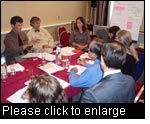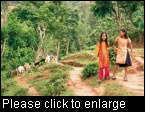 |
|
| Your source of information on natural resources in international cooperation - focusing on agriculture, forestry and environment |
| Home | Research Service | Publications | About InfoResources | Contact | Français | Español |
| Publications > | InfoResources News No 5 / 09 (December 2009)Special feature Implementation Research About InfoResources Discussing the future of agriculture
The organisers of the GCARDs have made use of the possibilities offered by new information and communication technologies to reach as many interested stakeholders as possible in an open and efficient way. E-consultations, blogs, updates of documents, comments, Twitter, YouTube videos, and many other features are part of this innovative and attractive process. The GCARDs were deliberately organised as a process rather than a single conference. Each GCARD is preceded and followed by a number of steps to implement the agreed actions through a series of regional and global consultations conducted to capture the perspectives of all stakeholders in the various systems of agricultural research, education and development. Currently, these steps are the following:
In addition, the GCARD process is providing bottom-up inputs regarding the ongoing reform process of the Consultative Group on International Agricultural Research (CGIAR). In the era of electronic communication and exchange, the hope is that the GCARD process will achieve its goal: a new global agricultural research system oriented towards concrete outcomes for poor farmers. Sources: Food price crisis: don’t forget the urban poor! The last food price crisis of 2007 and 2008 attracted a lot of attention among policy-makers. However, although the vulnerability of the urban population facing this crisis has been acknowledged, policy recommendations mainly focus on assistance to rural populations. Statistics show that food insecurity is higher in urban than in rural areas. Moreover, although food may be available on the markets, this does not necessarily mean that it is affordable for the urban poor. While they may have higher incomes than rural dwellers, they also have to purchase more goods and services and lack the possibility to grow their own food. The authors explain the different circumstances related to food insecurity in rural and urban areas, highlighting the impacts that may be expected from the given situation. Their policy recommendations for reducing urban vulnerability to food price crises focus on three goals: preservation of incomes, moderation of price increases, and strengthening of coping mechanisms. The proposed measures include temporary social protection programmes, development of appropriate monitoring and information systems, and further research in order to understand the nature of employment and labour markets in urban areas of developing countries. Source: The food price crisis and urban food (in)security. Marc J. Cohen and James L. Garrett. International Institute for Environment and Development and United Nations Population Fund. 2009. 36 p. www.iied.org/pubs/pdfs/10574IIED.pdf
Natural resource management and governance of land determine access to, and control of, assets that play a key role in rural livelihoods and often in power relations, as well. Pressure on land and natural resources is increasing due to population growth, depletion of resources, poor land potential, and climate change. This leads to competing claims. The emergence of local governments in rural areas is changing the institutions that influence access, control and management. This, in turn, is altering the way natural resources are used. The Royal Tropical Institute (KIT) in the Netherlands has published a new dossier on natural resource management and land tenure in order to sharpen the focus on these issues. A specific section of the dossier contains detailed information about natural resource management and land tenure in the context of decentralisation and governance. The publication also offers useful links to relevant articles, books and websites, with a regional focus on the countries of West Africa and the Sahel. Source: Natural Resource Management and Land Tenure, Royal Tropical Institute (KIT), August 2009. www.kit.nl/smartsite.shtml?ch=FAB&id=31298 ImplementationMultiple actors and multiple roles in governance of forests within landscapes
Source: Forests, landscapes and governance: multiple actors, multiple roles. J. Carter, K. Schmidt, P. Robinson, T. Stadtmüller, A. Nizami (eds). SDC, Helvetas and Intercooperation, 2009. 86 p. www.intercooperation.ch/offers/news/Bhutan-Interlaken-Internet-RGB.pdf How to document violations of the rights to adequate food and housing, water, land and territory that are related to monocultures for industrial agricultural production? Industrial agriculture, and especially monocultures, have had severe impacts on the environment and on people all over the world, particularly in developing nations with poor regulatory frameworks. A guide published by Fighting Hunger with Human Rights (FIAN) and the Habitat International Coalition (HIC) Latin America in June 2009 presents an analysis of the most prominent problems related to industrial agricultural production in monocultures – including forest plantations – from a human rights perspective. The guide provides tools for mapping, identifying and documenting human rights violations. These tools are intended for use by the communities affected by human rights violations related to monocultures, as well as their supporting organisations, and can be applied in support of advocacy strategies when bringing complaints to national and international human rights protection systems. The goal is to enable affected communities to claim their human rights. Focusing on the impacts that monocultures have especially on the poor rural population and on sustainable food production, the publication also intends to contribute to better monitoring of the effects of agrofuel expansion. Source: Monoculture and Human rights. Fighting Hunger with Human Rights (FIAN) and Habitat International Coalition Regional Office Latin America (HIC-AL), June 2009. 44 p. www.fian.org/resources/documents/others/monocultures-and-human-rights
Music and equity provide the soundtrack to the fair trade of African blackwood. The hardness and high oil content of Dalbergia melanoxylon, or mpingo as it is known in Tanzania, makes it highly prized among musical instrument makers, particularly for clarinets, oboes and bagpipes. However, this situation has induced the unsustainable harvesting of mpingo forests in Eastern and Southern Africa. The Mpingo Conservation Project (MCP) works with several communities in the forest regions of southeast Tanzania to help them obtain Forest Stewardship Council (FSC) certification. Meeting the FSC sustainable management criteria, though, is not as straightforward as it might seem. Calculating a sustainable felling quota is a complex undertaking: a forest inventory must be first carried out, followed by an estimation of the quantities of commercially useful timber, and finally markets need to be identified where customers can pay a higher price for this certified raw material. In addition, producing instrument-grade mpingo requires skilful work. Involved communities look forward to improvements of their quality of life thanks to the re-investment of profits from this programme into other local development projects. It is hoped that from now on provision of sustainably sourced African blackwood will be in the position to meet the demand of the market. Source: African blackwood – a sound choice for the woodwind musician. New Agriculturist, July 2009 www.new-ag.info/focus/focusItem.php?a=792
Aware of this, the Swiss Agency for Development and Cooperation (SDC), jointly with various other institutions, mandated the Centre for Development and Environment (CDE) in 2002 to support capacity development in geoinformation management in Sudan. Activities began with the provision of databases and maps, and later gradually shifted to reconstruction activities such as infrastructure rehabilitation and the provision of geoinformation services with a focus on capacity development. Main users have been the national authorities, UN Agencies, and international NGOs. A new website now makes the experience and information gained during the past eight years available to a broader public. The website also provides access to referenced and partly validated geodata, web-mapping applications, reports, and various types of maps. Source: CDE – Sudan Capacity Development in Geoinformation Management www.cde.unibe.ch/Tools/GIS_Sudan_TS.asp ResearchLess food on the plate due to climate change Based on detailed models, researchers of the International Food Policy Research Institute (IFPRI) have for the first time quantified the impacts of climate change on agriculture and food security. Although the results differ depending on the scenario, the trend is clear: without countermeasures, in 2050 yields will be lower than today. In developing countries the decrease will be clearly more marked than in industrialised countries. The highest losses are to be expected for irrigated cultures in South Asia. Climate change will also lead to a noticeably accelerated increase in food prices; wheat prices, for example, may double by 2050 due to climate change. Over the same time frame, per capita calorie availability will diminish. The problem of child undernutrition will become worse again. The authors argue that in order to prevent this grim outlook from materialising, investments are required both in development, in general, and in enhancing agricultural productivity, in particular. Moreover, policy-makers must give greater priority to adaptation to climate change. In concrete terms, the authors demand improved global data collection and investments of USD 7 billion annually in agricultural research, rural infrastructure and irrigation. Source: Climate Change – Impact on Agriculture and Costs of Adaptation. Gerald C. Nelson et al. International Food Policy Research Institute (IFPRI). September 2009. 30 p. www.ifpri.org/sites/default/files/publications/pr21.pdf About InfoResourcesFarewell, InfoResources
InfoResources was created in 2003 with the aim of supporting development professionals, above all, but also the interested public in general, in finding reliable information on these themes. InfoResources was a joint service provided by three information and documentation centres working in the area of development and natural resources. In the course of 2008, InfoResources was joined by partners from the South: SIMAS in Nicaragua, CETRAD in Kenya, and Intercooperation delegation offices in the Andes, Bangladesh, India, and Mali. To address varying information needs, the InfoResources team developed three publication series, distinct in concept and content:
Furthermore, our Question and Answer Service has been at the disposal of our audience for the provision of information on specific topics. Exchange of valuable knowledge and opinions regarding the various aspects of development in natural resources, exciting discussions with experts and partners from the South, and quite a few moments of working under pressure to provide our services on time and in high quality: this was InfoResources for us. Now circumstances have led to the termination of InfoResources activities by the end of 2009. Wishing to find out whether our services have been of use and whether they are still needed, we asked our readers to give us their opinion. The following graphs show that the InfoResources services were mainly used for study purposes and to support project work in the field. They also indicate that the majority of users think it will be difficult to find the information provided by InfoResources publications elsewhere. The complete results of this survey along with comments from our users can be accessed at: Many thanks for your support and interest! Your InfoResources Team Titles of all Focus issues produced by InfoResources
All past InfoResources publications will remain available at www.inforesources.ch
|



